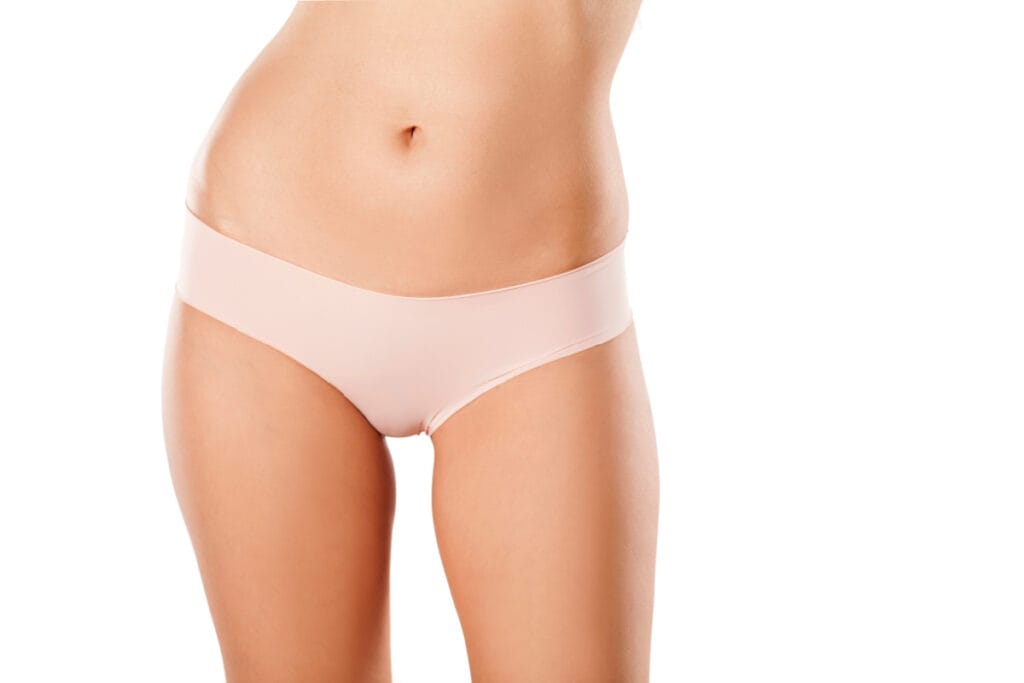Some women notice that they have larger labia that interfere with activities of daily living, such as wearing yoga pants, riding a bicycle, or sexual activity. Childbirth, aging, and genetics can all affect the size and shape of the labia, making this a common concern for women. Boston labiaplasty with female plastic surgeon Dr. Alannah Phelan offers a solution to large or protruding labia, requiring only a few days away from work to achieve customized, permanent results.

The labiaplasty procedure
Labiaplasty is a surgical procedure designed to reshape and reduce the size of the labia minora (the inner vaginal lips) . This surgery is performed to both alleviate discomfort and to improve the aesthetic appearance of the genital area.
During the pre-surgical consultation, Dr. Phelan will review your comprehensive medical history and discuss your goals. She will evaluate your anatomy and let you know if you are a good candidate for the procedure. Labiaplasty can be performed under local anesthesia or local anesthesia with sedation depending on your preference. During the surgery, Dr. Phelan will carefully trim excess tissue and reshape the labia to achieve a more balanced and symmetrical look. Sutures are dissolvable, and do not require removal after surgery.
“Dr. Phelan is simply amazing!!! She has compassion, is extremely skilled and has a wonderful demeanor. I felt so much humiliation showing her my body, but she never made me feel inadequate or less. She doesn’t realize that she gave me back the confidence that I lost many years ago. I will be forever grateful for that.”
What labiaplasty can treat
Labiaplasty can address a variety of concerns related to the labia, including:
- Excessive labial tissue: Overly large or asymmetrical labia can cause discomfort during physical activities, sexual intercourse, or while wearing tight or form-fitting clothing.
- Aesthetic concerns: Many women seek labiaplasty to improve the appearance of their genital area, improving their self-confidence and comfort.
- Age-related changes: As women age, the labia may lose elasticity and become elongated.
- Childbirth effects: Childbirth can cause significant changes to the labia, including stretching and tearing.
Good candidates for labiaplasty
The best candidates for Boston labiaplasty have large or protruding labia, who also identify with the following:
- You are in good overall health.
- After your consultation, you have realistic expectations about the outcome of the surgery.
- You have physical discomfort or irritation due to enlarged or asymmetrical labia.
- You are self-conscious about your labia for cosmetic reasons.
- You have completed childbearing, as future pregnancies may affect the results of the surgery.
- You do not have any active infections or uncontrolled medical conditions that could interfere with healing.
- Key Benefits
- Glossary
- More comfort. Labiaplasty can reduce irritation during activities such as exercise, cycling, or sexual intercourse.
- Improved aesthetics. The procedure can provide a more symmetrical, proportional appearance.
- Easier hygiene. By reducing excess labial tissue, labiaplasty can make it easier to maintain personal hygiene.
- Better comfort in clothing. Many women experience less discomfort and chafing when wearing tight clothing, such as swimsuits or yoga pants, after labiaplasty.
- Labiaplasty: A surgical procedure that reduces the size or reshapes the labia minora or labia majora.
- Labia: The folds of skin around the vaginal opening, including the labia minora and labia majora.
- Recovery: The process of healing after surgery, which involves rest and following post-operative care instructions.
- Anesthesia: Medication used to prevent pain during surgery, typically administered as general or local anesthesia.
- Results: The outcomes of the surgery, including the appearance and function of the labia.
- Vulva: The external part of the female genitalia, including the labia.
- Resection: Surgical removal of part of the tissue, as in the reduction of the labia.
- Labia Minora: The inner folds of the labia, which are often the focus of labiaplasty.
- Cosmetic Surgery: Surgical procedures performed to enhance or change appearance, including labiaplasty.
- Labia Majora: The outer folds of the labia, which can also be altered during Boston labiaplasty.
- Plastic Surgeons: Medical doctors specializing in plastic surgery, including labiaplasty.
- Vaginal Rejuvenation: Procedures intended to restore the appearance and function of the vaginal area, including labiaplasty.
- General Anesthesia: Medication that induces a temporary loss of consciousness during surgery.
- Clitoral Hood: The fold of skin covering the clitoris.
- Labial Reduction: Another term for labiaplasty, focusing on reducing the size of the labia.
- Surgical Procedure: A medical operation, such as labiaplasty, involving an incision and manipulation of tissues.
- Vaginal Opening: The entrance to the vagina, surrounded by the labia.
- Sexual Intercourse: Physical intimacy that may be affected by labiaplasty.
- Pain Medication: Drugs prescribed to manage pain during the recovery period.
- Genital Area: The region of the body including the labia, which is the focus of labiaplasty.
- Local Anesthesia: Medication that numbs a specific area of the body during surgery.
- Vaginoplasty: Vaginoplasties are surgical procedures to reconstruct the vagina, or a vaginal surgery; this procedure is distinct from surgery of the vulva, such as labiaplasty.
- Wound: The incision site that requires care during the recovery period.
- Swelling: A common post-operative symptom that subsides over time.
- G-Spot: An area inside the vagina that may be associated with sexual pleasure.
- Vulva: The external female genitalia, which includes the labia.
- Labiaplasties: Multiple procedures involving the reduction or reshaping of the labia.
- Labium: A term for either the labia minora or labia majora.
- External Female Genitalia: The outer parts of the female reproductive system, including the labia.
- Outer Labia: Another term for the labia majora, the outer folds of the labia.
- Inner Labia: Another term for the labia minora, the inner folds of the labia.
- Vaginal Area: The region around the vaginal opening, including the labia.
- Female Genital Cosmetic Surgery: Procedures aimed at altering the appearance of the female genitalia, including labiaplasty.
- Mommy makeover: A customized set of procedures performed after pregnancy, designed to reverse an individual woman’s post-childbearing effects. Labia reduction surgery in Boston may be included in this procedure plan.
- Wedge labiaplasty: A technique that removes excess, sagging labia minora tissues with the excision of a wedge-shaped piece of tissue.
- Trim labiaplasty: A technique that removes excess, sagging labia minora tissues with the excision of a piece of tissue along the length of the labia.
- Absorbable suture: Sutures used to close surgical incisions that are safely absorbed by the body, and do not require removal from the plastic surgeon.
Recovery and side effects
Most patients take only Tylenol and Motrin after surgery, and return to work within a few days, though strenuous exercise and sexual activity must be avoided for six weeks. Common side effects include swelling, bruising, and mild discomfort, which can be managed with pain medication (either prescription or over-the-counter) and cold compresses. Dr. Phelan will provide you with detailed post-operative instructions that you should follow closely for a smooth recovery and optimal results. It is also important to attend all follow-up appointments to monitor healing and address any concerns that arise during the healing process.
“Dr. Phelan is the most personable, caring, and attentive physician I’ve ever had. From my first consultation to my last post-op appointment, Dr. Phelan patiently answered all of my questions—and never made me feel silly for about my concerns. She was very responsive and quick to respond to emails, which I genuinely appreciated since waiting on anything can be a bit nerve wracking. ”
Results
The results of labiaplasty are typically long-lasting, providing relief from physical discomfort and improving the overall appearance of the genital area. The details of the procedure are tailored to your desired outcome and goals, so the pre-surgical consultation with Dr. Phelan is critical to set you up for a successful procedure outcome that you are happy with.
FAQs
References »
Özer M, Mortimore I, Jansma EP, Mullender MG. Labiaplasty: motivation, techniques, and ethics. Nat Rev Urol. 2018 Mar;15(3):175-189. doi: 10.1038/nrurol.2018.1.
Oranges CM, Sisti A, Sisti G. Labia minora reduction techniques: a comprehensive literature review. Aesthet Surg J. 2015 May;35(4):419-31. doi: 10.1093/asj/sjv023.
Rowley M, Thawanyarat K, Shah J, Nazerali R. Labiaplasty and Insurance: To Cover or Not to Cover? Archives of Plastic Surgery. 2022 Apr 6;49(2):285-286. doi: 10.1055/s-0042-1744428.
Bizjak-Ogrinc U, Senčar S. Sutureless Laser Labiaplasty of Labia Minora. The Journal of Sexual Medicine. 2021 Oct;9(5):100406. doi: 10.1016/j.esxm.2021.100406.
Willis RN, Wong CS, Pai A, Patel BC. Labiaplasty Minora Reduction. 2023 Apr 3. In: StatPearls [Internet]. Treasure Island (FL): StatPearls Publishing; 2023 Jan–.
Furnas HJ. Trim Labiaplasty. Plastic and Reconstructive Surgery Global Open. 2017 May 23;5(5):e1349. doi: 10.1097/GOX.0000000000001349.
Sasson DC, Hamori CA, Placik OJ. Labiaplasty: The Stigma Persists. Aesthetic Surgery Journal. 2022 May 18;42(6):638-643. doi: 10.1093/asj/sjab335
Dr. Phelan believes beautiful results begin with a great relationship between the patient and surgeon, and works closely with her patients to understand their aesthetic vision to build a customized treatment plan to achieve their goals. With meticulous attention to detail, an artistic eye, and precise surgical techniques, Dr. Phelan delivers natural-looking rejuvenation and enhancements that complement each patient’s innate beauty. It’s an honor for her to help patients become the best version of themselves, because everyone deserves to feel confident in their appearance.
To learn more about labiaplasty in Boston, schedule your consultation with Boston female plastic surgeon Dr. Alannah Phelan. Please call Boston Plastic Surgery at (617) 786-7600.




